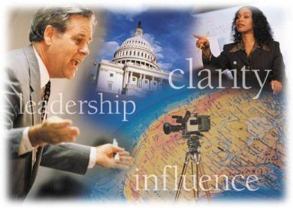
In politics, every voter looks for a candidate in whom he or she can believe. And candidates can win voters’ trust in many ways, some of which have more to do with whom the voter is than the candidate.
One principle always hold true, however: every constituent must be convinced that he or she is seeing a real person on the stump. You may make the ballot through political insider skills, but what voters want is someone who shares their values. Your "pitch," in other words, is yourself.
This article outlines three simple rules for building such trust with voters through speeches. These are the communication skills that lead to effective communication in the political arena. These rules should be easy to follow, because they involve simple but powerful techniques of effective public speaking.
1. Establish a dialogue with listeners
Did you know that we transmit 55 percent of our message through body language and other visual clues, 38 percent from vocal quality, and only 7 percent from content? Obviously, good presentation skills are essential for any persuasive speech.
All this means that 93 percent of what’s getting through to the voter has everything to do with how you look and sound! It even works on camera in media training.
I saw this in action in debate prep sessions in the political campaign of state Rep. Martha Fuller Clark (D–NH), running for New Hampshire’s 1st Congressional District. Clark’s closing statement just wasn’t catching fire. I advised bringing some physical gestures to her remarks. She repeated the speech, this time pointing with her index finger every time she said, “I will always... ” The difference in her effectiveness was dramatic.
2. Reveal who you are
This advice may seem to contradict traditional political wisdom. But think about the people you really trust. Do they seem to be hiding their true motives? Wearing a mask? Pretending to be someone they’re not? Constituents will only believe in a political candidate if they think they’re seeing the real thing on stage or in front of the camera.
You already possess the ideal vehicle for delivering this side of yourself to voters: the sound of your voice. When you commit fully to the truth of what you’re saying, listeners will hear it immediately. Now you’ll be using persuasive techniques to convince voters, not simply delivering a good speech.
3. Connect your voice to your emotions
No political strategy is more valuable than this. The best storytelling technique is to let your voice reflect your feelings about the things that matter to you and your constituents. Allowing your vocal style to reflect your emotions should be one of your strongest attributes as a candidate.
One of my clients, U.S. Sen. Lisa Murkowski (R–Alaska), introduced a bill on the Senate floor concerning the salmon fishery. The legislation would make an enormous difference to her constituents, and Murkowski clearly felt strongly about its passage. Yet her speech couldn’t sound like “mere” policy—it had to reflect the senator’s deep personal commitment to the legislation. And that’s what we worked on in her delivery.
So how do you achieve this level of vocal expressiveness? Begin by listening to yourself on a tape recorder. Are you expressive or do you speak in a monotone? Do you hear “peaks and valleys” of pitch inflection, so listeners will stayed tuned? These are critical techniques of nonverbal communication--the kind that convinces audiences!
The longer your speech, the more important such vocal variety becomes. Otherwise audiences lose their attentiveness. What good is it to speak on issues you really care about if your vocal style is turning voters in another direction?
Anecdotes and stories are ideal for achieving such vocal variety. But they must have a different flavor from policy issues in the same speech. That’s the strategy I used with U.S. Rep. Mike Capuano (D–Mass.), who tells a wonderful story about a sailing trip in which the Coast Guard offered unanticipated but very welcome assistance.
To build trust with constituents and win elections, then, reveal yourself and your passion through your voice. Politicians have sought votes using this formula for ages. As an effective tool of elections, it’s never changed. As always, it comes down to showing people that they are the reason you’re running for office.


